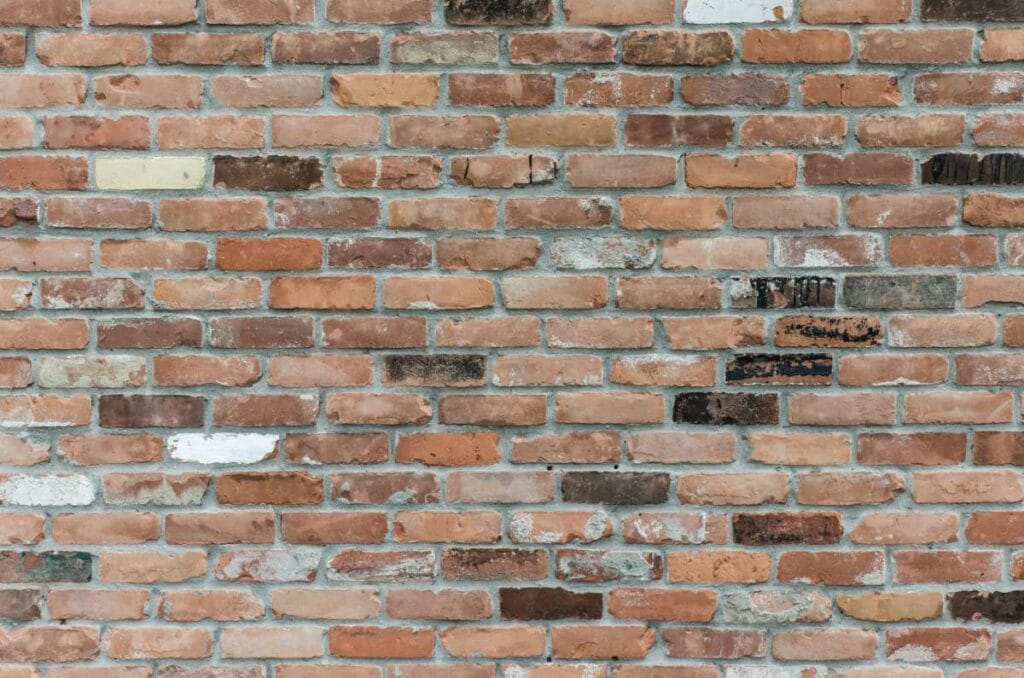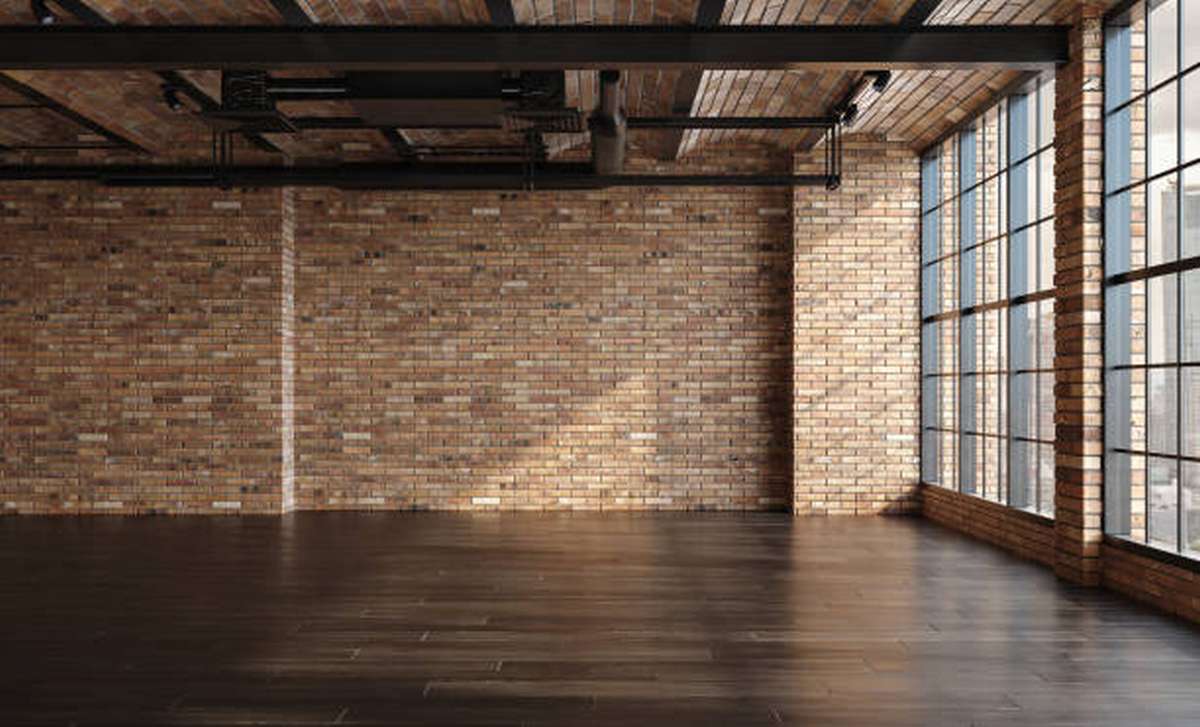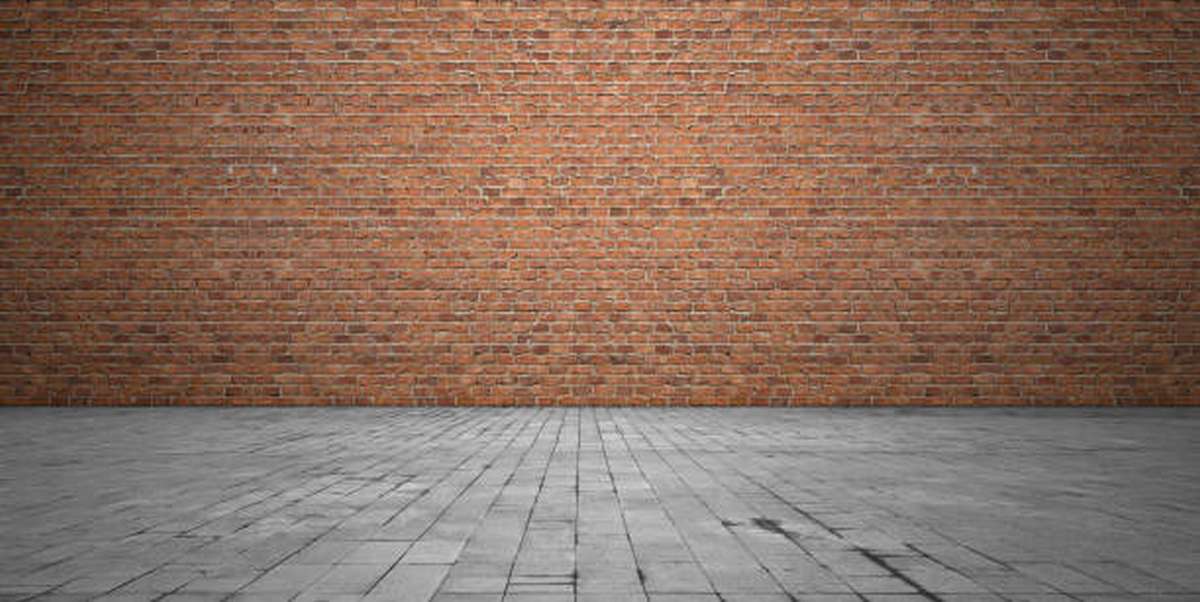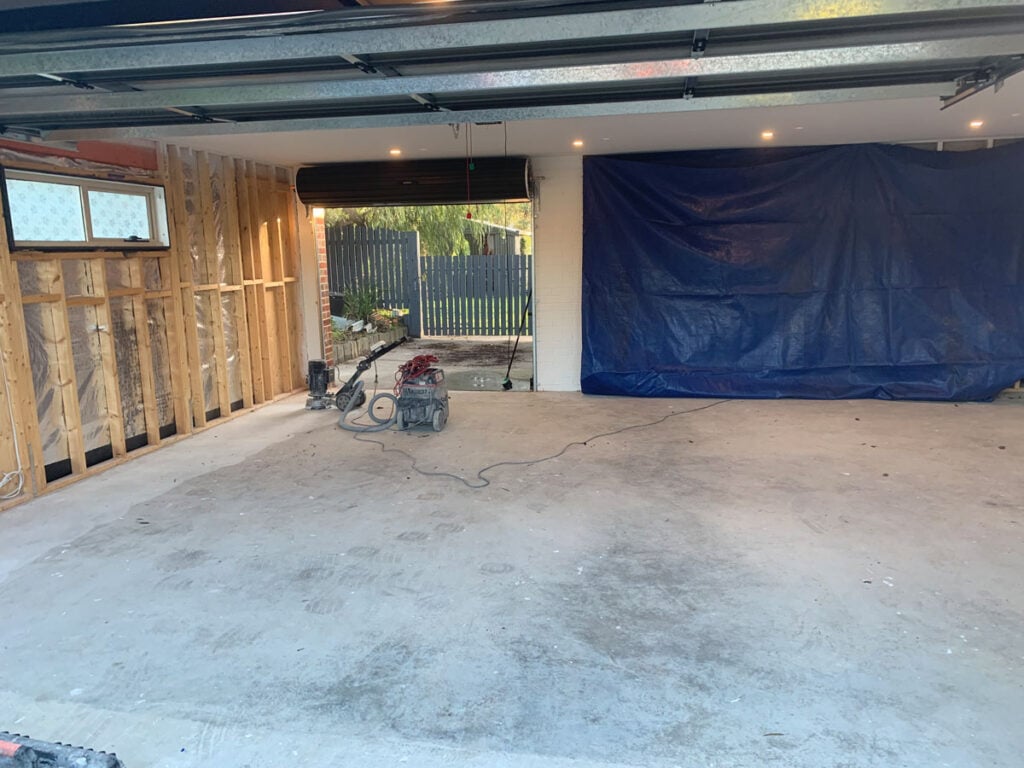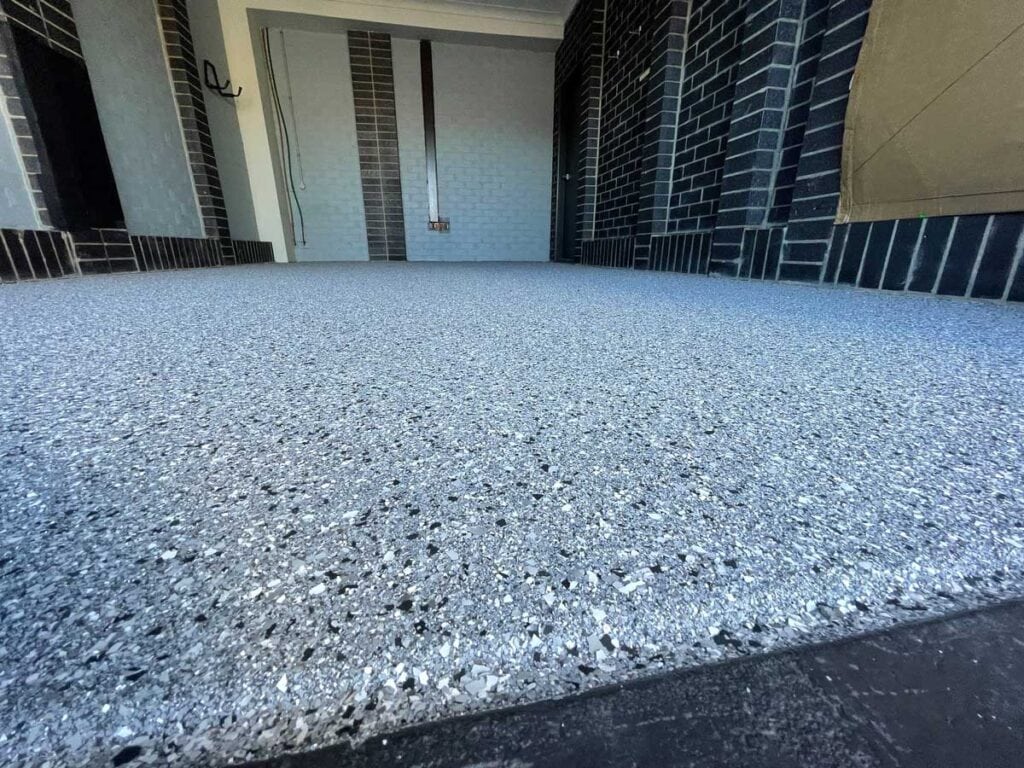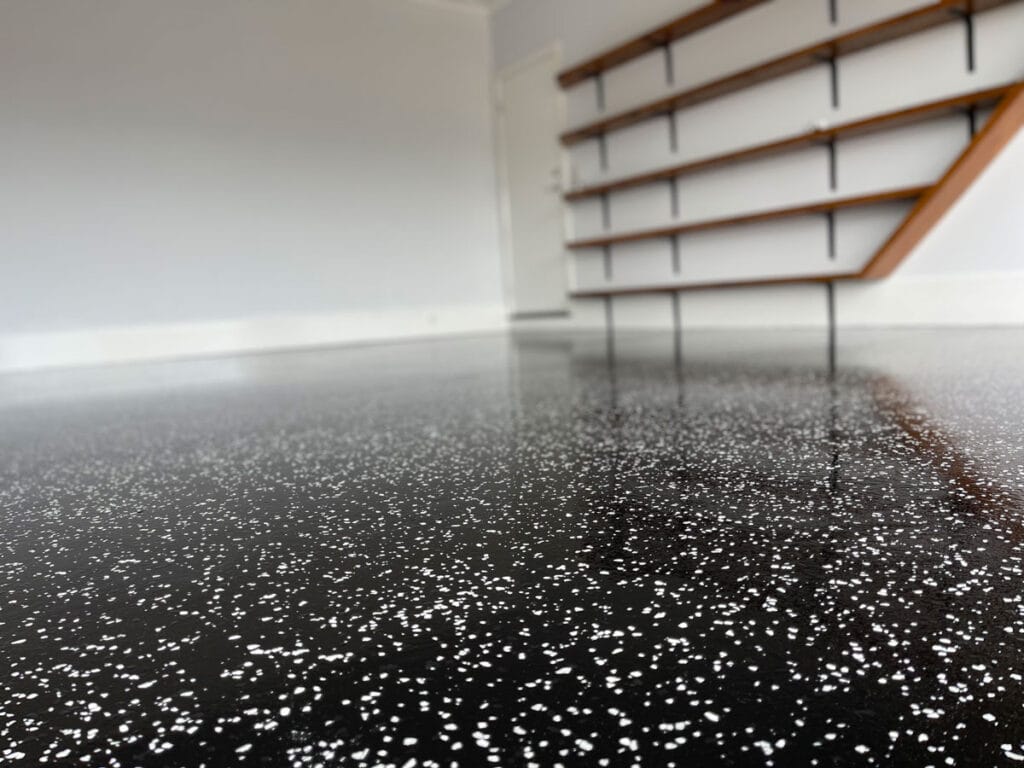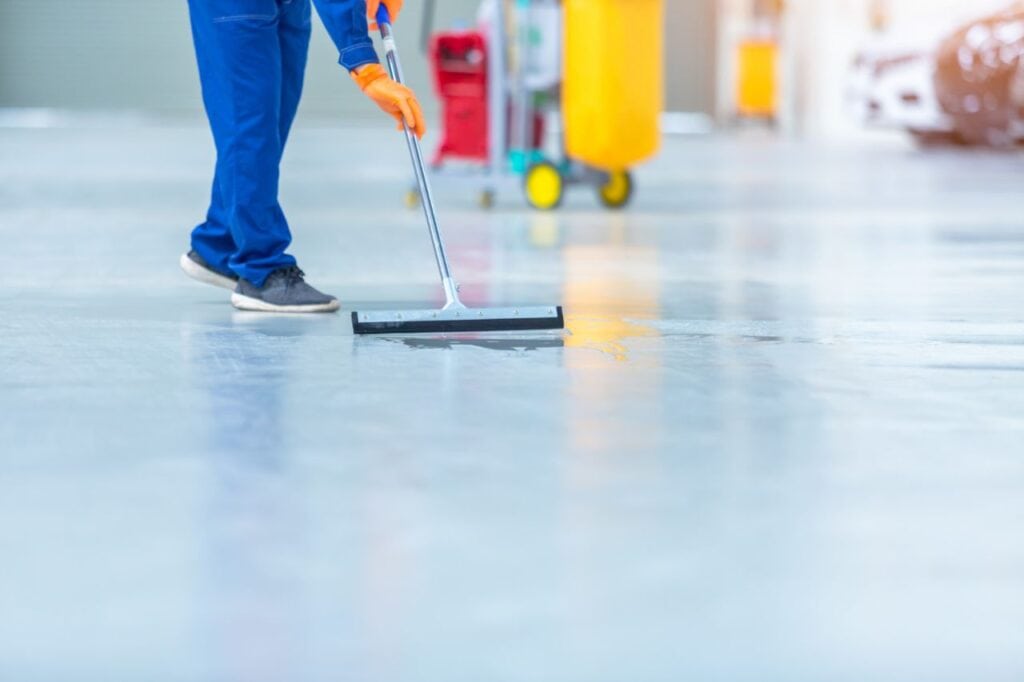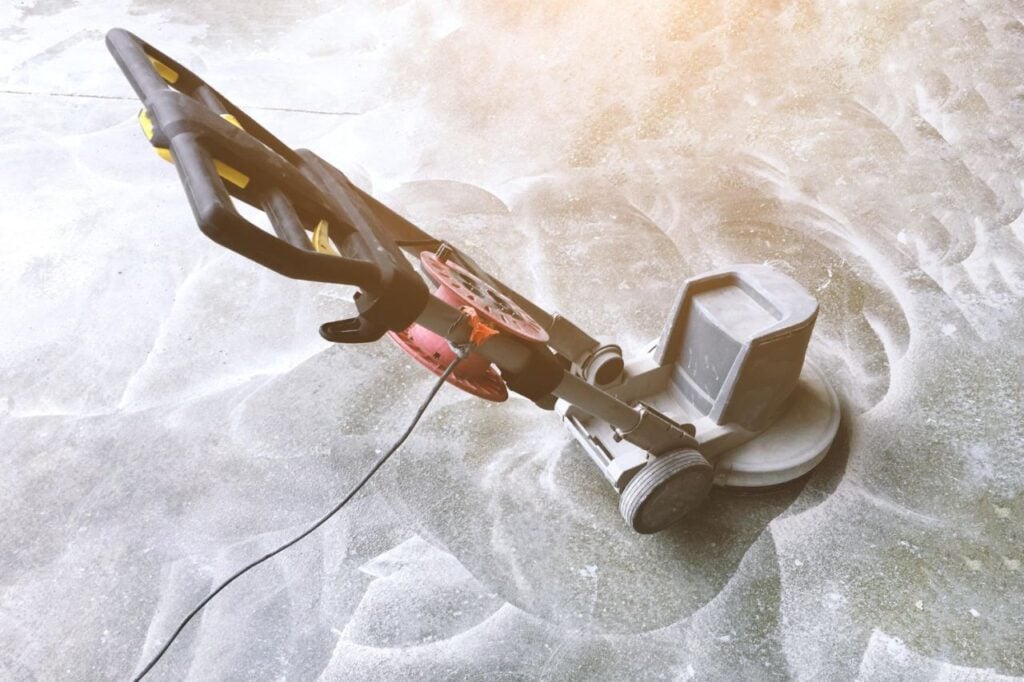Maintaining brick floors is a relatively straightforward task that can be accomplished with a few essential tools and cleaning solutions. Dust mops, vacuums, microfiber mops, and gentle cleaning agents are useful in keeping brick floors in good condition. Despite small indentations that can trap dirt, brick floors are designed to withstand outdoor use and various environmental factors.
The durability of brick floors ensures their longevity, with proper care enabling them to last for many decades. In addition, their ease of cleaning further simplifies maintenance and contributes to their extended lifespan. However, brick floors may develop stains over time due to wear and tear, and regular home cleaning efforts may only sometimes deliver optimal results.
When brick floors are exposed to prolonged grit and dirt, these abrasive particles can act as sandpaper and gradually degrade the surface. Additionally, dirt accumulation can compromise the integrity of the floor's sealant.
Proper Way To Clean A Brick Floor
A well-maintained brick floor not only enhances the aesthetic appeal of your space but also ensures its longevity. Regular cleaning is essential to prevent the accumulation of dust and dirt in the mortar joints between the bricks, which can gradually damage the floor's sealant and the bricks themselves. In this article, we will explore the proper techniques for cleaning and maintaining your brick floor, ensuring its cleanliness and durability.
What is a Brick Floor?
A brick floor is a type of flooring composed of individual bricks laid side by side with mortar joints. It provides a rustic and charming look to various spaces, such as patios, walkways, and interiors. Brick floors are known for their durability and can withstand heavy foot traffic. However, proper cleaning and maintenance are essential to preserve their appearance and prevent damage.
Vacuuming Brick Floors
Brick floors benefit greatly from daily sweeping or vacuuming to maintain them clean and in good shape. Start by using an ordinary brush to clean the surface, paying careful attention to mortar joints. The idea is to successfully clean the cracks and crevices of any dirt and grit that may have been hiding there.
For more thorough cleaning, opt for a vacuum cleaner specifically designed for hard floors. Look for one with a soft brush attachment, as it can effectively remove fine dust and pet hair. Be cautious of using attachments with hard beater bars, as they may potentially harm the seal, bricks, or mortar.
It's important to note that unsealed brick floors, especially in high-traffic areas, can generate a significant amount of grit. This grit can damage other types of flooring materials like carpets, tiles, or hardwood. By implementing a daily sweeping or vacuuming routine, you can minimise the presence of grit and protect other areas of your home from potential damage.
Selecting a Cleaning Solution
When it comes to choosing a cleaning solution for your brick floor, you have several options. Commercial cleaners with a mildly alkaline solution are available in the market. Alternatively, you can use common household ingredients to create your own cleaning solution. Let's explore a few effective options:
Vinegar
Vinegar is a versatile and frequently used ingredient in DIY cleaning solutions. It's an excellent choice for cleaning brick floors due to its natural cleaning abilities and acidic properties. To create a vinegar-cleaning solution, combine one cup of vinegar with a gallon of water. Stir the mixture thoroughly to incorporate the ingredients. You can use the entire solution to clean your bricks or keep a bottle on hand for regular use. Vinegar not only cleans the brick flooring but also disinfects it, eliminating pathogenic bacteria and leaving it with a shiny finish.
Baking Soda
Baking soda is another commonly used ingredient in cleaning solutions, and it complements vinegar well. For stubborn stains on your brick floor, create a paste-like consistency by mixing two tablespoons of baking soda with a gallon of water. Baking soda, being alkaline, helps in removing acidic messes and deodorises the floors, eliminating any unpleasant odors.
Borax
Similar to baking soda, borax is an alkaline substance that can be effective in cleaning brick floors. However, it's important to use it sparingly due to its higher alkalinity. For general or spot cleaning, mix two tablespoons of borax with a gallon of water. This solution can be used to clean your brick floor and maintain its cleanliness.
Mopping the Brick Floor
Brick floors are easiest to maintain and clean using a moist mop. Wet the mop and squeeze off the excess water. For efficient and effortless water removal, a rotating mop can be of great assistance.
Mopping bricks requires greater pressure and a more brisk back-and-forth motion than other types of flooring. Using this method, you can access previously inaccessible areas between the bricks. Brick floors are hard, therefore you shouldn't use a sponge or flat fabric mop on them because they will wear out soon. Use a stiff nylon brush to scrape away any stains or filth that prove difficult to remove.
Monitoring the Water and Wiping Off the Liquid
It's important to keep an eye on the level of water in the mop bucket at all times. If the water starts to look dirty or muddy, you should dump it out and make a new cleaning solution. Using dirty water to mop can compromise the quality of your work.
Sweep the floor with a dry mop or soft towel to remove moisture from the grout and cracks after cleaning. As the floor dries, this step reduces the likelihood of streaking and smudging.
Restoring the Shine of Your Brick Floor
Over time, your brick floor may lose its shine due to regular use and exposure to dirt. However, there is a simple method to restore its luster without resorting to intense scrubbing, polishing, or sealants. By using a mixture of warm water and vinegar, you can achieve a shiny surface effortlessly. Add a cup of vinegar to your mop bucket and mop the floors as usual. The cleaning properties of vinegar will help bring back the shine to your brick surface.
Note of Caution for Concrete Bricks
It's necessary to use caution while washing a brick floor with vinegar if the bricks are concrete rather than clay. Vinegar's acidity can eat away at the mortar between concrete blocks. Although continuous exposure to common white vinegar will not destroy concrete blocks, it can weaken them over time. Unlike clay bricks, which do not require cement, concrete's cement can react with vinegar's acetic acid. In order to get the best results from this cleaning method, you must start with authentic clay bricks.
Why Does Dust Appear on Brick Floors?
One common issue with newly installed brick floors is the presence of fine dust that tends to emerge from the surface. This dust is typically light in colour and has a very fine texture, which can create a mess when it spreads to other areas of the house.
This dust is often a result of bricklayers using muriatic acid, also known as hydrochloric acid, to clean the bricks during installation. Muriatic acid is a powerful chemical used to clean surfaces like brick and concrete. However, when it comes into contact with the lime in the grout or mortar commonly used between the bricks, it reacts and extracts lime from the grout. As a result, the pale or white dust forms and becomes visible on the brick floor.
Cleaning and maintaining your brick floor is a crucial part of its upkeep. Regular sweeping or vacuuming, along with proper mopping techniques and the use of suitable cleaning solutions, will help preserve the cleanliness, appearance, and integrity of your brick floor. By following these guidelines, you can enjoy the beauty and durability of your brick flooring for years to come.
How Often to Clean Brick Floors
Brick flooring, both indoors and out, benefits from a regular weekly cleaning regimen to keep it looking its best. The first step in cleaning your floor is to remove any loose dirt or debris by giving it a good sweep, vacuuming, steam cleaning, or dry mopping.
Mortar, rust, mildew, paint, and graffiti are just some of the stains that can damage brick surfaces. There are a number of strategies you can use to successfully eliminate these stains. You can get good results by utilising acid washing, bleach, or commercial cleaners made especially for bricks. Cleaning by hand can be difficult, but a solution of vinegar and water or diluted water and laundry detergent will help remove soot spots. Liquid dish soap or laundry detergent combined with water can be an efficient cleaning solution for oil stains.
Cleaning Brick Floor With Steam Cleaner
A highly recommended tool is a steam cleaner, which can be used on various indoor surfaces, including bathroom floors and kitchen countertops. Steam cleaners are particularly effective and efficient when it comes to cleaning spills and stains on brick floors.
The heat generated by the steam cleaner helps to dislodge dirt, grime, and moisture from the small crevices and pores of the bricks. In addition to providing a thorough cleaning, steam cleaning can disinfect surfaces without chemicals and eliminate odours. It can be especially beneficial when preparing the floors for sealing or resealing, as steam cleaning helps to condition the surfaces.
Dealing With the Grout
Damage and stains are more likely to occur in the grout lines of a brick floor. The high absorbency rate of grout makes it ideal for cleaning up leaks and messes. This causes grout discolouration and may even damage the brickwork.
Sealing the grout will stop water and other liquids from leaking into the joints between the bricks. Maintaining its efficacy requires only the annual application of grout sealer.
Cleaning grout lines with a steam cleaner is another viable option. Be wary, though; steam has the potential to dissolve some sealants. Grout removal and replacement may be required in extreme circumstances where considerable damage has occurred.
Does Brick Floor Need to Be Sealed?
Brick flooring, similar to natural stone floors, is porous and can absorb liquids if not properly sealed. Unsealed brick floors may also feel gritty and can lead to the transfer of dust from one room to another.
Two main types of sealers can be used on brick floors. The first is a penetrating sealer, which the brick absorbs and fills the pores from within. This effectively blocks any liquid from penetrating the surface and causing damage.
The second type is a film-forming sealer, which is applied on top of the brick and creates a glossy film resistant to water and stains. This film acts as a protective barrier and makes maintenance easier.
Due to the added protection and improved ease of maintenance, film-forming sealers are popular among homeowners. The film smooths out the surface, covering the tiny pores and preventing dirt and dust from getting trapped.
When to Hire Professional Brick Cleaners
Considering Professional Assistance
If your indoor brick floors or outdoor patio bricks appear dull or heavily stained and you find yourself unable to dedicate the necessary time and effort to clean them, it may be worth considering hiring professional brick cleaners. These experts possess the skills and equipment required to efficiently handle all your brick cleaning needs, whether it's for masonry installation, repair services, or landscape projects.
Why Choose Professionals?
Professional brick cleaners come equipped with specialized tools such as pressure washers, steam cleaners, and a variety of effective cleaning chemicals. By enlisting their services, you can rest assured that your bricks will receive thorough cleaning and be restored to their original condition, saving you valuable time and effort in the process.
Finding Reputable Brick Cleaning Services
When seeking professional assistance for brick cleaning, it's essential to conduct thorough research and select a reputable and experienced provider in your local area. Look for professionals who specialise in brick cleaning and restoration, as they possess the necessary knowledge and resources to safely and effectively clean your brick surfaces, enhancing both their appearance and longevity.
By entrusting your brick cleaning needs to skilled professionals, you can enjoy the benefits of beautifully cleaned bricks without the hassle and ensure the long-term durability of your brick surfaces.
Conclusion
Brick floors are made up of individual bricks set in a row with mortar in between them. Although they are resilient and can survive plenty of foot traffic, they still require regular care and cleaning to stay looking good and prevent damage. Dust and grime in the mortar joints between the bricks can wear down the sealant and the bricks themselves, so keeping the floor clean on a regular basis is crucial. Well-kept brick floors not only add to the room's visual value but also guarantee its durability. Dust and debris can accumulate in the mortar joints between the bricks and cause the sealant and the bricks themselves to deteriorate if they aren't cleaned regularly.
Brick floors that haven't been sealed properly can produce a lot of grit, which can scratch more delicate surfaces. Sweeping or vacuuming the floor once a day can greatly reduce the amount of grit that accumulates there. A cleaning solution can be made by combining one cup of vinegar with one gallon of water and giving the mixture a good stir. The floors can be deodorised by making a paste with baking soda and water. Use Borax gently for regular or spot cleaning.
Brick floors are simplest to maintain and clean when mopped regularly. Brick floors are more difficult to mop than other types of flooring because they demand more pressure and a faster back-and-forth motion. Use a firm nylon brush to get in between the bricks, and keep an eye on the water level in the mop bucket. If your brick floors have lost their lustre, simply mop them as usual after adding a cup of vinegar to the mop water. However, care must be taken if the bricks are made of concrete since the acidity of the vinegar might erode the mortar holding the blocks together.
Muriatic acid, or hydrochloric acid, is a strong chemical that can be used to clean tough masonry and concrete. When it reacts with the lime in the grout or mortar, it removes the lime. It is crucial to keep a brick floor clean and in good condition by sweeping, vacuuming, steam cleaning, and dry mopping it on a regular basis. Graffiti, paint, mildew, rust, and other unsightly stains can be scrubbed away with acid washing, bleach, or industrial cleaners. Cleaning brick floors with a steam cleaner is a quick and easy way to get them looking like new.
They are effective in removing dust, filth, and moisture from brick pores and cracks, disinfecting surfaces without the use of chemicals, and neutralising unpleasant odours. Water and other liquids should not be able to seep into the bricks, so it is important to seal the grout lines. Penetrating sealers and film-forming sealers are the two most common types of sealers used on brick floors. Both the penetrating and film-forming sealers prevent moisture from permeating the surface and causing damage while also making maintenance simpler. Expert brick cleaners can take care of any and all brick cleaning tasks with ease.
Pressure washers, steam cleaners, and powerful cleaning chemicals are just some of the specialised equipment they bring to the job. To ensure the long-term longevity of your brick surfaces, it is essential to undertake extensive research and choose a renowned and competent service in your area.
Content Summary
- Cleaning and maintaining brick floors is a straightforward task.
- Essential tools for cleaning brick floors include dust mops, vacuums, and microfiber mops.
- Brick floors are designed to withstand outdoor use and environmental factors.
- Proper care and maintenance can make brick floors last for many decades.
- Stains may develop on brick floors over time due to wear and tear.
- Regular cleaning is necessary to prevent damage to the floor's sealant and bricks.
- Vacuuming brick floors daily helps keep them clean and in good shape.
- Use a soft brush attachment on a vacuum cleaner for fine dust and pet hair removal.
- Avoid using a hard beater bar attachments on brick floors to prevent damage.
- Regular sweeping or vacuuming reduces the presence of grit and protects other flooring materials.
- There are different cleaning solutions available for brick floors.
- Vinegar is an excellent cleaning solution for brick floors and has disinfecting properties.
- Baking soda can be used to remove stubborn stains and deodorise brick floors.
- Borax is effective for general or spot cleaning of brick floors.
- Moisten a mop to clean brick floors and use a rotating mop for water removal.
- Use a stiff nylon brush for tough stains on brick floors.
- Monitor the water in the mop bucket and replace it when it becomes dirty.
- Wipe off excess moisture from the floor after cleaning to prevent streaking and smudging.
- Restore the shine of brick floors using a mixture of warm water and vinegar.
- Exercise caution when cleaning concrete bricks with vinegar to avoid damage.
- Dust may appear on brick floors due to the use of muriatic acid during installation.
- Weekly cleaning is recommended for brick floors to maintain their appearance.
- Different stains on brick floors require specific cleaning strategies.
- Steam cleaners are highly effective for cleaning spills and stains on brick floors.
- Grout lines on brick floors are susceptible to damage and stains.
- Sealing the grout prevents damage and makes maintenance easier.
- Unsealed brick floors can be gritty and transfer dust between rooms.
- Penetrating and film-forming sealers can be used to protect brick floors.
- Consider hiring professional brick cleaners for heavily stained or dull brick surfaces.
- Professional brick cleaners have specialised tools and expertise to restore brick surfaces efficiently.
Frequently Asked Questions
Interior brick floors may be cleaned with moderately strong alkalis, such as washing soda or borax. Use one tablespoon in a gallon of warm water, stronger if needed. Use a string mop or scrub brush mop; sponge or flat cloth mops can be shredded on the coarse brick.
Due to its darker tone, brick flooring is very good at hiding dirt but also quite good at attracting dust due to its rougher texture. However, brick flooring is relatively easy to keep clean – with regular vacuuming and mopping.
Once sealed, they are water resistant, although we recommend a sealant is applied every few years to ensure ongoing soil and water resistance. When properly sealed, brick flooring is less prone to water damage than real hardwood floors, making it a better option for bathroom and kitchen installations.
Water erodes the mortar that holds the bricks or stone together, destroying the structure's integrity. Water will also degrade the bricks themselves. Erosion contributes to this, but the damage will be more severe if you live anywhere with freezing temperatures in the winter.
It would help if you scrubbed the dirty bricks with table salt and dish soap. The spreadable paste will work well if you are using a bristle brush. Once you have removed the paste with a washcloth, use a sealant to keep the bricks in tip-top condition.
